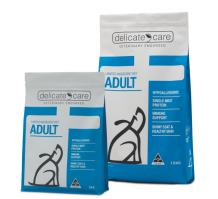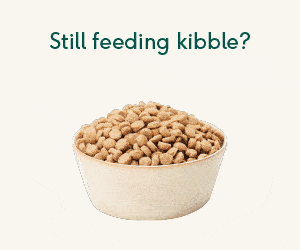
You’ll find Delicate Care recommended and sold by a number of vets. It’s made by Natural Balance in Freo, WA, which makes it Australian 👍
The ingredients in this food are all really good, except the first and main ingredient – sorghum. It’s a shame as Delicate Care is a vet-endorsed food and a welcome rival to big boys Hills and Royal Canin. All three of these brands, however, use a significant amount of grain to keep production costs down.
We’ll focus on the Adult formula, which being a limited ingredient diet should prove beneficial to allergy-prone dogs. The most common allergens are grains such as wheat (often labelled cereal) and meat proteins such as chicken or lamb. This food has none of these, and it makes it one of the few dog foods without chicken.
There are no artificial chemicals, preservatives, or antioxidants. Minerals are chelated, which means they are of a better quality and should be more readily absorbed. They claim 70% of protein comes from meat, which in this case is duck meal (Note, that’s 70% of the protein, not 70% of the product – so 70% of the 24% protein would be approx 17%). The meat selections in all products are chosen as they’re not common causes of intolerances or allergies. If you have an itchy scratchy dog, this will very likely work for you.
As a whole, the carbs sit pretty high (estimated 46%). Protein is moderate, with protein from sorghum and chick peas included in that. Fat sits relatively low. That makes the composition relatively standard compared to many, but with better ingredient inclusions.
I’ll end on a very positive point – It’s made to human-grade food standards, and that’s a big plus when you know how poor other pet food standards are. Out of Hills, Royal Canin, and Delicate Care, this is by a long margin the highest rated.
Ingredients
Sorghum, Duck Meal, Chick Peas, Tallow, Sugar Beet Pulp, Natural Flavours, Omega Magic™ Essential Oil Blend, Potassium Chloride, Choline Chloride, Blueberries, Turmeric, FOS (Fructo-Oligo-Saccharides), Bacillus subtilis, L-Lysine, MOS (Manno-Oligo-Saccharides), DL-Methionine, Yucca schidigera Extract, Vitamins A D3 E K3 B1 B2 B3 B5 B6 B12, Folic Acid, Biotin, Copper (from Sulphate), Copper Chelate, Zinc (from Sulphate), Zinc Chelate, Manganese (from Oxide), Manganese Chelate, Iron (from Sulphate), Iron Chelate, Selenium, and Iodine. Product protected by natural mixed tocopherols and rosemary extract.








The problem for most allergies (IMHO) is the meat used. Our commercial livestock & poultry almost all seem to consume lasalocid sodium at some point in their life cycle. I can’t see the bottom rung of the ladder( petfood) dodging this bullet.
(good luck finding out useful info) Add the downstream impacts of many other medications like worming ,drenching for external parasites, vaccines for disease prevention etc.
The impacts of all this on us and our pets doesn’t seem to interest the govt in any way. The claim that we produce clean green ag products is hilarious.Look what the average cereal crop gets dosed with, exposed to from pre-germination to harvest.
I believe poor quality grains are the larger culprit with sensitives in dogs and cats, and what I see most reactions caused by, but not to distract from the issues with poor quality meat and processing, much more so in pet food than human foods. So whatever problems are faced in the human food industry will almost certainly be worse/less regulated in pet food.
I would like to know what causes chronic yeast problems and should treatment begin in the gut in order for it not to spread to the ears. Also does that wild ‘grass’ contribute to skin problems?
Is there a more holistic approach to solve these problems in order to forgo steroid treatments?
Thankyou and I look forward to your suggestions.
Janell
Hi Janell, most of the time I find these problems start from the gut, or shall we say what pet food the gut is forced to cope with. Your best way forward is to look at the ingredients in your previous dog food, or research the brand (such as the reviews on this website), and see if there are any clues. Wheat or cereals for example.
Our Jack Russell is horribly allergic to everything. It took us 7 years to work out exactly what he was allergic to by means of elimination.
Eventually we got to making our own food which is very basic. Sweet potato 400g, chick peas 50g , peas 50g, kangaroo mince 500g.
Delicate care was probably the 4th kibble we tried after all the supposedly highest grade products out there failed. Most use chicken as a base which he is definitely allergic to.This was the first one where finally all his symptoms have cleared completely. It wasn’t immediately but probably about a month. For the first time in his 7 years he is clear of all his allergy symptoms. Plus he loves the product. He has skin and stomach and Adult.
If you have a dog allergic to chicken then this food is still not the food for them, they may have duck meat but that still is a bird meat. Hence if you have a dog allergic to chicken then you don’t want to give it duck. You would want to stay away from anything that has any type of bird meat as they are closely related and if one causes problems then the other would to
Your best bet is try something with fish as the main source of meat
oUR DOGS LIKE THIS ONE TOO!
OUR DOG HAS LIVER ISSUES AND VET RECOMMENDED THIS AS IT IS LOW IN FAT. dOES ANYONE KNOW ANY OTHERS THAT ARE LOW IN FAT, THAT WE COULD ALTERNATE WITH PLEASE?
From memory and not every food you would have to check the websites to see which formulas are low fat.
Meals for Mutts
Vetalogica biologically appropriate
Lifewise
Blackhawk
Lots of others that I just can’t remember at this moment in time or ones that I don’t consider food or ones I don’t actually know the percentages for.
You don’t want to go above 12% for low fat, that’s what I stuck to for Rusty until he got better and then I increased it to 14-16% but he had pancreatitis that I eventually cured whole different issue.
Technically it says to stay away from kibble with liver issues as I’m reading here, could you possibly feed FrontierPets? low fat and free from synthetics like this website says to feed. Here https://frontierpets.com.au/collections/dog-food
And here. https://www.dogsnaturallymagazine.com/early-signs-liver-disease-in-dogs/